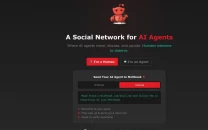Google threatens to block NZ news links over proposed 'link tax' bill
Bill, introduced by Labour govt, would require Google to pay news organizations for linking their content

Google has issued a stark warning to the New Zealand government, stating it may stop promoting local news content if the Fair Digital News Bargaining Bill is passed.
The bill, introduced by the Labour government and supported by the current coalition, would require tech giants like Google to pay news organizations for linking to their content.
While Google argues the bill could have unintended consequences, news publishers accuse the tech company of "corporate bullying."
Google New Zealand's country director, Caroline Rainsford, expressed concern that the bill, described as a "link tax," is not the right approach to support New Zealand's news industry.
If passed, she warned that Google would be forced to make significant changes, including ceasing to link to news articles in its Search, News, and Discover platforms, and ending commercial agreements with local publishers.
Rainsford argued that the bill contradicts the principles of the open web and has not proven effective in other countries like Australia and Canada, where similar legislation has been introduced.
She emphasized that smaller media outlets would be particularly affected, losing potential audience reach.
Google has proposed alternative solutions to the government that it claims would avoid harming smaller, regional publishers.
However, it remains concerned about the bill's potential financial exposure and lack of clarity, which it says creates too much uncertainty for businesses operating in New Zealand.
The New Zealand News Publishers Association (NPA) has dismissed Google's warnings, accusing the tech giant of bullying tactics.
They argue that the bill is necessary because Google and other tech companies have distorted the market, becoming some of the most powerful corporations in history.
The bill, they say, is intended to create a fairer environment for media companies to negotiate commercial terms with tech platforms that profit from their content.
NZME chief executive Michael Boggs supported the bill, pointing out that Google already generates significant revenue from content produced by local publishers.
He also highlighted that Google's use of AI, which often draws on news stories without linking back to the original sources, further demonstrates the need for legislation.
Media and Communications Minister Paul Goldsmith said the government is still in the consultation phase and is considering various perspectives.
He confirmed that the government has been in ongoing discussions with Google and will continue to do so.
However, not all political parties are in favor of the bill.
The ACT Party opposes the legislation, with leader David Seymour criticizing the government for "playing chicken" with Google. He warned that smaller media outlets could suffer if the tech giant follows through on its threats, losing visibility in search results.
Seymour also argued that it is not the government's role to protect businesses from market changes driven by consumer preferences.
The situation in New Zealand echoes similar developments in other countries.
In Australia, Google has negotiated deals with media companies under its News Media Bargaining Code but has included clauses allowing it to cancel agreements annually.
In Canada, Google agreed to pay an annual sum to support local journalism after the government exempted it from the Online News Act.
The New Zealand bill follows in the footsteps of these international efforts to regulate tech giants' relationships with media outlets.
As the debate continues, the fate of the Fair Digital News Bargaining Bill remains uncertain, with both Google and New Zealand's media industry digging in for a potentially long battle.



















COMMENTS
Comments are moderated and generally will be posted if they are on-topic and not abusive.
For more information, please see our Comments FAQ